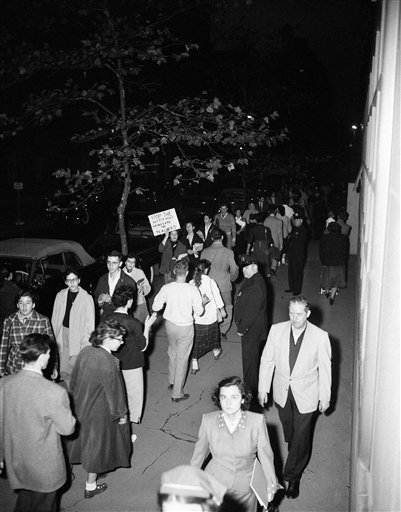Whether a Pennsylvania teacher could be discharged for “incompetency” for refusing to answer questions about his possible membership in the Communist Political Association, the precursor to the Communist Party of the United States, was the question before the Supreme Court in Beilan v. Board of Education, 357 U.S. 399 (1958).
Court glossed over First Amendment concerns of dismissal of teacher
In ruling that the dismissal of longtime teacher Harold Beilan did not violate his due-process rights, the majority glossed over First Amendment concerns. However, Justice William O. Douglas wrote in dissent that the dismissal raised just such issues.
Writing for the majority, Justice Harold H. Burton relied on Adler v. Board of Education (1952) for the principle that “school authorities have the right and the duty to screen the officials, teachers, and employees as to their fitness to maintain the integrity of the schools as a part of ordered society.”
Burton also relied on the Pennsylvania Supreme Court’s earlier ruling in the case that incompetency included Beilan’s “deliberate and insubordinate refusal to answer the questions of his administrative superior in a vitally important matter pertaining to his fitness.” Burton concluded that the Pennsylvania high court’s reasoning was “not inconsistent with the Federal Constitution.”
Dissenters said the decision was ‘at war with the Bill of Rights’
Chief Justice Earl Warren and Justices Douglas and William J. Brennan Jr. authored dissents, although Douglas was the only one to explain at any length why Beilan’s dismissal implicated the First Amendment. He explained that “we have here only a bare refusal to testify; and the Court holds that sufficient to show that these employees are unfit to hold their public posts. That makes qualification for public office turn solely on a matter of belief — a notion very much at war with the Bill of Rights.”
Though often ignored today, the Court’s decision in Beilan was cited in many subsequent First Amendment decisions of the Court, including notables such as Konigsberg v. State Bar (1961), Elfbrandt v. Russell (1966), and Keyishian v. Board of Regents (1967).
David L. Hudson, Jr. is a law professor at Belmont who publishes widely on First Amendment topics. He is the author of a 12-lecture audio course on the First Amendment entitled Freedom of Speech: Understanding the First Amendment (Now You Know Media, 2018). He also is the author of many First Amendment books, including The First Amendment: Freedom of Speech (Thomson Reuters, 2012) and Freedom of Speech: Documents Decoded (ABC-CLIO, 2017). This article was originally published in 2009.

